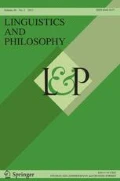Abstract
Category mistakes are sentences such as ‘Colourless green ideas sleep furiously’ or ‘The theory of relativity is eating breakfast’. Such sentences are highly anomalous, and this has led a large number of linguists and philosophers to conclude that they are meaningless (call this ‘the meaninglessness view’). In this paper I argue that the meaninglessness view is incorrect and category mistakes are meaningful. I provide four arguments against the meaninglessness view: in Sect. 2, an argument concerning compositionality with respect to category mistakes; in Sect. 3 an argument concerning synonymy facts of category mistakes; in Sect. 4 concerning embeddings of category mistakes in propositional attitude ascriptions; and in Sect. 5 concerning the uses of category mistakes in metaphors. Having presented these arguments, in Sect. 6 I briefly discuss some of the positive motivations for accepting the meaninglessness view and argue that they are unconvincing. I conclude that the meaninglessness view ought to be rejected.
Similar content being viewed by others
References
Barwise J., Perry J. (1990) Semantic innocence and uncompromising situations. In: Martinich A.P. (eds) The philosophy of language (2nd ed). Oxford University Press, Oxford
Beall J.C., van Fraassen B.C. (2003) Possibilities and paradox. Oxford University Press, New York
Black M. (1962) Metaphor. In: Black M. (eds) Models and metaphors. Cornell University Press, Ithaca, NY
Block, N. (1998). Semantics, conceptual role. In E. Craig (Ed.), Routledge encyclopedia of philosophy. London: Routledge. Retrieved December 01, 2006, from http://www.rep.routledge.com/article/ W037.
Boisvert D., Lubbers C. (2003) Frege’s commitment to an infinite hierarchy of senses. Philosophical Papers 32: 31–64
Camp E. (2004) The generality constraint and categorical restrictions. Philosophical Quarterly 54: 210–231
Camp E. (2005) Critical study of Joseph Stern, Metaphors in context. Nous 39: 715–731
Camp E. (2006) Metaphor in the mind: The cognition of metaphor. Philosophy Compass 1(2): 154–170
Chomsky N. (1957) Syntactic structures. Mouton, The Hague
Chomsky N. (1965) Aspects of the theory of syntax. MIT Press, Cambridge MA
Davidson D. (2001) On saying that. In: Davidson D. (eds) Inquiries into truth and interpretation. Clarendon Press, Oxford
Davidson D. (2001) What metaphors mean. In: Davidson D. (eds) Inquiries into truth and interpretation. Clarendon Press, Oxford
Diamond C. (2001) What nonsense might be. In: Diamond C. (eds) The realistic spirit. MIT press, Cambridge MA
Drange T. (1966) Type crossings. Mouton, The Hague
Dummett M. (1981) Frege: Philosophy of language (2nd ed). Duckworth, London
Evans G. (1982) The varieties of reference. Clarendon Press, Oxford
Fine K. (2003) The non-identity of a material thing and its matter. Mind 112: 195–234
Fogelin R. (1988) Figuratively speaking. Yale University Press, New Heaven
Frege G. (1952) On sense and reference. In: Black M., Geach P. (eds) Translations from the philosophical writings of Gottlob Frege. Blackwell, Oxford
Haack R.J. (1971) No need for nonsense. Australasian Journal of Philosophy 49: 71–77
Heim I., Kratzer A. (1998) Semantics in generative grammar. Blackwell Publishers, London
Hodges W. (2001) Logic. Penguin, Harmondsworth
Lakoff G. (1971) Pressuposition and relative well-formedness. In: Jakobovitz A., Steinberg D. (eds) Semantics: An interdiciplinary reader. Cambridge University Press, Cambridge
Lambert K. (1968) On the no type theory of significance. Australasian Journal of Philosophy 46: 79–86
Maddy P. (1980) Perception and Mathematical intuition. Philosophical Review 89: 163–196
Magidor, O. (2007). Category Mistakes. D.Phil dissertation, University of Oxford.
Magidor O. (2009) The last dogma of type confusions. Proceedings of the Aristotelian Society 109: 1–29
Martinich A.P. (1984) A theory of metaphor. Journal of Literary Semantics 13: 35–56
McCawley J. (1970) Where do noun phrases come from. In: Jacobs R., Rosenbaum P. (eds) Readings in English transformational grammar. GINN, Boston, pp 166–183
McCawley J. (1971) Interpretative semantics meets Frankenstein. Foundations of Language 7: 285–296
McDaniel, K. (unpublished manuscript). Categories of being.
Montague R. (1974) The proper treatment of quantification in ordinary English. In: Thomason R. (eds) Formal philosophy: Selected papers by Richard Montague. Yale University Press, New Heaven, CT
Moran R. (1997) Metaphor. In: Hale B., Wright C. (eds) A companion to the philosophy of language. Blackwell Publishers, Oxford
Pap A. (1960) Types and meaninglessness. Mind 69: 41–54
Parsons T. (1981) Frege’s hierarchies of indirect senses and the paradox of analysis. Midwest Studies of Philosophy 6: 35–57
Reimer M., Camp E. (2006) Metaphor. In: Lepore E., Smith B. (eds) The Oxford handbook of philosophy of language. Oxford University Press, Oxford
Routley R. (1966) On significance theory. Australasian Journal of Philosophy 44: 172–209
Routley R. (1969) The need for nonsense. Australasian Journal of Philosophy 47: 367–384
Russell B. (1905) On denoting. Mind 14: 530–538
Russell B. (1908) Mathematical logic as based on the theory of types. American Journal of Mathematics 30: 222–262
Ryle G. (1938) Categories. Proceedings of the Aristotelian Society 38: 189–206
Searle J. (1979) Metaphor. In: Ortony A. (eds) Metaphor and Thought. Cambridge University Press, Cambridge
Sorensen R. (2001) Vagueness and contradiction. Oxford University Press, Oxford
Stanley J. (2002) Nominal restrictions. In: Peters G., Preyer G. (eds) Logical form and language. Cambridge, MA, OUP
Stern J. (2000) Metaphor in context. MIT Press, Cambridge, MA
Strawson P.F. (1950) On referring. Mind 59: 320–344
Strawson P.F. (1952) Introduction to logical theory. Methuen, London
Williamson T. (1994) Vagueness. Routledge, London
Author information
Authors and Affiliations
Corresponding author
Rights and permissions
About this article
Cite this article
Magidor, O. Category mistakes are meaningful. Linguist and Philos 32, 553–581 (2009). https://doi.org/10.1007/s10988-010-9067-0
Published:
Issue Date:
DOI: https://doi.org/10.1007/s10988-010-9067-0



